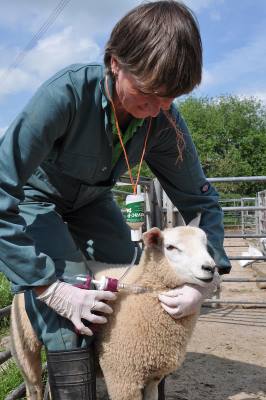UK sheep producers urged to protect lambs from spring disease threats
MILTON KEYNES, UK, 19th March 2019 – Sheep pregnancy scanners across the UK have reported variable results over the winter with some flocks in some areas carrying 20% to 40% fewer lambs than last year. Farmers are therefore being urged to protect every newborn lamb this spring from preventable disease threats.
“It looks like lamb numbers may well be down nationally this year, but if we get a kind spring weather-wise that will certainly help producers maximise the number of lambs reared, which is what counts. However, what sheep producers simply cannot afford to do is lose more lambs to easily preventable diseases,” says sheep vet Phillipa Page from Flock Health Limited.
Ms Page says that farmers facing a lower lamb crop must not react to a depressed productivity challenge by skimping on essential vaccinations that will protect young lambs against diseases that can cause significant mortalities.
“Clostridial diseases and pasteurellosis are both silent killers. Typically, the first sign a farmer will see is a dead lamb; sometimes losses can be catastrophic.”
“In an era when proven and highly cost-effective vaccines are available, no lamb should die from a clostridial disease,” she adds.
Ms Page says that it is impossible to control the multiple and varied stress-related ‘trigger’ factors (e.g. a sudden change in the weather, change in diet or parasite infection) for clostridial disease and pasteurellosis in lambs, so vaccination of these newborns is essential.
“Provided a ewe has been fully vaccinated against these two key disease threats, the colostrum her lambs receive shortly after birth gives them short-lived protection against pasteurellosis and clostridial diseases like pulpy kidney, braxy, blackleg and tetanus. However, this so-called passive immunity only lasts for so long. This means lambs must be vaccinated themselves from three weeks of age.”
Key points:
- Clostridial diseases and pasteurellosis are real threats in unvaccinated lambs.
- Colostrum from vaccinated ewes gives disease protection to lambs provided they receive enough in the first 24 hours, but only lasts for a limited period.
- Vaccination of newborn lambs from three weeks of age will protect them from the main clostridial diseases and pasteurellosis.

Vaccination of lambs from three weeks of age will protect them from the main clostridial diseases and pasteurellosis.
About MSD Animal Health
For more than a century, MSD, a leading global biopharmaceutical company, has been inventing for life, bringing forward medicines and vaccines for many of the world’s most challenging diseases. MSD Animal Health, a division of Merck & Co., Inc., Kenilworth, N.J., USA, is the global animal health business unit of MSD. Through its commitment to the Science of Healthier Animals®, MSD Animal Health offers veterinarians, farmers, pet owners and governments one of the widest range of veterinary pharmaceuticals, vaccines and health management solutions and services. MSD Animal Health is dedicated to preserving and improving the health, well-being and performance of animals. It invests extensively in dynamic and comprehensive R&D resources and a modern, global supply chain. MSD Animal Health is present in more than 50 countries, while its products are available in some 150 markets. For more information, visit www.msd-animal-health.com or connect with us on LinkedIn and Twitter.
